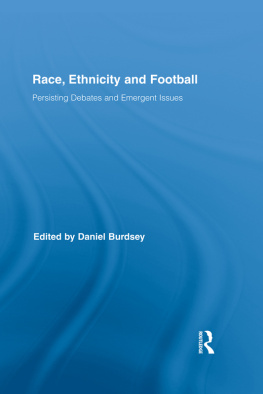
Raising the Race
Families in Focus
Series Editors
Anita Ilta Garey, University of Connecticut
Naomi R. Gerstel, University of Massachusetts, Amherst
Karen V. Hansen, Brandeis University
Rosanna Hertz, Wellesley College
Margaret K. Nelson, Middlebury College
Katie L. Acosta Amigas y Amantes: Sexually Nonconforming Latinas Negotiate Family
Rich J. Daniel Barnes, Raising the Race: Black Career Women Redefine Marriage, Motherhood, and Community
Ann V. Bell, Misconception: Social Class and Infertility in America
Mignon Duffy, Amy Armenia, and Clare L. Stacey, eds., Caring on the Clock: The Complexities and Contradictions of Paid Care Work
Anita Ilta Garey and Karen V. Hansen, eds., At the Heart of Work and Family: Engaging the Ideas of Arlie Hochschild
Katrina Kimport, Queering Marriage: Challenging Family Formation in the United States
Mary Ann Mason, Nicholas H. Wolfinger, and Marc Goulden, Do Babies Matter? Gender and Family in the Ivory Tower
Jamie L. Mullaney and Janet Hinson Shope, Paid to Party: Working Time and Emotion in Direct Home Sales
Markella B. Rutherford, Adult Supervision Required: Private Freedom and Public Constraints for Parents and Children
Barbara Wells, Daughters and Granddaughters of Farmworkers: Emerging from the Long Shadow of Farm Labor
Raising the Race
Black Career Women Redefine Marriage, Motherhood, and Community
Rich J. Daniel Barnes
Rutgers University Press
New Brunswick, New Jersey and London
Library of Congress Cataloging-in-Publication Data
Barnes, Rich J. Daniel, 1973
Raising the race : Black career women redefine marriage, motherhood, and community / Rich J. Daniel Barnes.
pages cm. (Families in focus)
Includes bibliographical references and index.
ISBN 9780813561998 (hardcover : alk. paper) ISBN 9780813561981 (pbk. : alk. paper) ISBN 9780813562001 (e-book (web pdf)) ISBN 9780813575384 (e-book (epub))
1. African American women in the professions. 2. African American women in the professionsFamily relationships. 3. Work and familyUnited States. I. Title.
HD6054.2.U6B37 2016
305.48'896073dc232015004943
A British Cataloging-in-Publication record for this book is available from the British Library.
Copyright 2016 by Rich J. Daniel Barnes
All rights reserved
No part of this book may be reproduced or utilized in any form or by any means, electronic or mechanical, or by any information storage and retrieval system, without written permission from the publisher. Please contact Rutgers University Press, 106 Somerset Street, New Brunswick, NJ 08901. The only exception to this prohibition is fair use as defined by U.S. copyright law.
Visit our website: http://rutgerspress.rutgers.edu
For my Nana, Myrtle L. Bishop
for my Mom and Dad, Gwen and Leon Daniel
and for the othermothers and just-like fathers, here and passed on,
who have contributed to raising me...
For Darnel, my love, for taking this journey with me,
and for Nailah, Nikhil, and Nasir,
the reasons for the journey...
Contents
This book is an intervention. It adds Black career women to the research on professional women who opt-out of the professional labor force (Belkin 2003) and engages a conversation that to date has omitted Black women. By investigating the ways in which Black career women conceptualize their decision to be stay-at-home moms or change their relationships with work, I draw scholarly attention to the contemporary Black elite: their marriages, their child-rearing strategies, and their residential and school choices. And by centering the conversation on Black elite women, I challenge stereotypical myths and images of Black women as welfare queens and strong black women.
I have sought to complete the research and the analysis while keeping Black career womens everyday lived experiences at the fore (Collins [1990] 2000) and situating the inquiry in the literatures, theories, and methodologies that reside in several disciplines (anthropology, sociology, history, urban studies, womens studies, Africana studies, and family studies). I have explored a variety of topical areas (work and family conflict, child care, residential patterns, migration patterns, inequalities, gender strategies, race, and class), and this work has taken me to the southern United States, where my study is situated in Atlanta, Georgia, as well as our collective memory of Africa.
Part of this is the normal work that goes into completion of an ethnographic project, but I have also grounded the work in the Black feminist ethic of talking back to each potential stakeholder or gatekeeper, as bell hooks suggests (1988). This is a difficult process because it requires approaches that are often at odds: the scholarly and the communal. My objective then is not just to add to the scholarly canon but also to provide a platform from which to change and, in some instances, to save Black womens lives (Hull and Christian 1986, xxv). This is not to say that some magical answer, hidden within the pages of this book, will transform all the structures that have negatively affected Black womens lives; rather, I attempt to make one more aspect of Black womens lives visible, thereby rendering Black women visible. Making Black womens lives visible is a type of self-preservation, and that, according to Audre Lorde, is an act of political warfare (Lorde 1988).
I am humbled by the number of people who have asked about the results of this study. In its early stages of analysis, I presented it at various academic and corporate events and people repeatedly asked me about my findings, relayed their own experiences, or inquired when my analysis would be available. One group even asked if I might be available to offer workshops. I was repeatedly and pleasantly surprised when scholars mentioned they had read my work or were using it in their classrooms. Although widespread dissemination and discussion were definitely my goals, the continued interest solidified the studys importance. I knew it was important to me, but I often wondered if it was important to others. In addition, some Black women, after having heard about the study through various social networks, admonished me to hurry up and get it done because they needed it.
Of course, I am indebted to the women who graciously allowed me to poke and prod them and their families for the benefit of my research. They reminded me each day that this project was not about me. I hope that I have done their voices a service in my retelling. Fiction writers often say that their characters write their books and they are simply the conduits. While the analysis is mine and could therefore be severely flawed, the experiences belong to these women, and they make this study so important. I am grateful to each and every one of them and to their families. We continue to exchange cards, occasional phone calls, and social media posts; we have created an odd kind of friendship. I wish I could call their names and pay homage to their stories and the selflessness they exuded when I asked them if they would participate in the study. To each of them, I want you to know,










